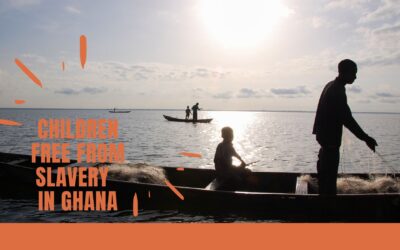Editor’s note: Free the Slaves College Coordinator Laura Murphy recently visited FTS programs in Ghana. This is the first of her four-part blog on her reflections. To learn more about how you can start a Free the Slaves chapter at your school, you can contact Laura at laura.murphy@freetheslaves.net
Last month, on June 13, Ghana celebrated the World Day against Child Labor by unveiling their new National Plan of Action for the Elimination of the Worst Forms of Child Labor in Ghana. Representatives from the ILO, UNICEF, the US Embassy, Free the Slaves, and our partner Challenging Heights gathered
along with over 400 people, including Ghanaian school children, to celebrate Ghana’s increased commitment to end the most hazardous forms of child labor by 2015.
The highlight of the event was a speech given by Dominic Impraim, a twelve year old student at Challenging Heights School who aspires to be a musician. His dream was almost lost after spending nine years in slavery on Ghana’s Volta Lake. He shyly spoke, in his native Fante language, of the horrors of his life as a child slave. He admitted that he was shocked when he learned through taunting by the slaveholder that his family had sent him to work in the fishing town of Yeji in exchange for only GHC5.00 (the equivalent of about $3.30). Living nine hours away from home and family, young Dominic was forced to work all day and all night and rarely allowed to sleep. The crowd gasped when he recounted how he was physically and verbally abused each day and especially harshly when he asked for food. He recalled instances when he was deprived of food for more than two days though he was forced to “work as usual” on Ghana’s Volta Lake.
But Dominic is an example of the success Ghana is having in changing the lives of child slaves. Dominic was rescued only one year ago by Challenging Heights, a major contributor to the National Plan of Action. Just after his rescue, Dominic was provided with rehabilitation services and reunited with his family. Because his mother is mentally challenged, he is currently under the care of his grandmother. His grandmother was provided with microfinance by Challenging Heights to expand her “kenkey” and farming business and she is now enrolled in a community microcredit group that will prevent her from sending Dominic back to work. Dominic is in school for the first time and excelling in his studies with full support from Challenging Heights for his school fees, uniforms, books, and writing materials. He credits Challenging Heights for the massive change in his life and the potential he is just now discovering in himself.
Kofi Awoonor, celebrated Ghanaian novelist and professor, remarked in his brief keynote address that, in fact, Dominic had said everything that needed to be said. It is stories like Dominic’s that make the work we do to eradicate slavery and child labor so urgent. And since approximately 70% of the funding Ghana receives to fight child labor comes from donors, organizations, and government agencies in the US, we need to listen even more carefully and act even more urgently.

